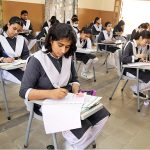 ISLAMABAD, Sep 3 (APP): The funeral prayers of veteran Kashmiri Hurriyat leader and the icon of Kashmir freedom movement Syed Ali Geelani were offered in absentia at the capital’s Faisal Mosque.
ISLAMABAD, Sep 3 (APP): The funeral prayers of veteran Kashmiri Hurriyat leader and the icon of Kashmir freedom movement Syed Ali Geelani were offered in absentia at the capital’s Faisal Mosque.
President Dr. Arif Alvi, federal ministers, parliamentarians and a large number of people from different walks of life offered the prayers. National Security Adviser Dr Moeed Yusuf, Director General Inter-Services Intelligence Lt Gen Faiz Hameed, Federal Minister for Information and Broadcasting Chaudhry Fawad Hussain, and other government officials attended.
Syed Ali Geelani passed away Wednesday night at his home in Srinagar, the capital of Indian Occupied Kashmir at the age of 92.
He was laid to rest early Thursday morning in Srinagar amidst heavy deployment of the Indian occupation force, which had earlier snatched the body from the family.

Syed Ali Geelani has been known for his principle stance on Kashmir issue and his remarkable leadership qualities. He stood in front of worst Indian oppression for the cause of self-determination right of Kashmiris of IIOJK. He departed for his eternal abode on 1 September 2021.
He will always be remembered as a resolute fighter for Kashmiri rights through his peaceful and upright struggle.
Geelani inspired three generations of Kashmir in resisting illegal Indian occupation and unabated tyranny. He was a true voice and hero of the Kashmiris struggle for self-determination, who never lost his ideological moorings for a single moment.
In recognition of lifelong struggle for Kashmiris, Pakistan on its 74th Independence Day, awarded Syed Ali Shah Geelani with Nishan-e-Pakistan; country’s highest civilian award.
He always rejected any notion of direct talks with the New Delhi government unless it formally “accepts Kashmir as a disputed territory” and stopped describing the region as an “integral part of India”.
His long and precarious journey for the legitimate cause of Kashmiris started well before his formal political career which started from the platform of Jammat-e-Islami in 1952. He soon rose to become district chief of Kupwara and Baramulla districts.
He spent more than twelve years of his life in jail. he was first arrested in 1962 on the charges of “raising the Kashmir issue”.
He initially struggled for his cause through mainstream politics but later on realized that government of India had never been sincere in resolution of Kashmir issue.
Geelani staunchly opposed the enactment of Indian draconian law of Public Safety Act (PSA) and openly challenged then chief minister Sheikh Mohammad Abdullah when he introduced the stringent public Safety Act in the region.
The act, termed a lawless law by Amnesty international, was brought to be used against timber smugglers. However, it was later modified to imprison political voices. Under the law, anyone could be imprisoned for up to two years without trial.
Syed Ali Geelani played an active role in formulation of MUF in 1987 ahead of provincial elections, when all Muslim parties came under a single platform; “Muslim United Front” (MUF) against pro-India parties including National Conference. Only four candidates of MUF, including Geelani managed to secure seats due to alleged rigging. Geelani, along with three other winners, was jailed.
This was the watershed moment, which marked the beginning of an armed resistance against “Indian rule.”
The National Conference – Congress political alliance formed a government, which was dissolved in early 1990s as the armed rebellion broke out. Lawyers and activists were jailed while political activity was banned; Geelani and comrades resigned from his seats in protest.
In 1992, foundation of All Parties Hurriyat Conference (APHC) was laid. It was a platform of at least 30 pro-freedom parties to take forward Kashmir’s fight to self-determination. The Jamat e Islami (JeI) was represented by Geelani.
In August 2004, Geelani along with Muhammad Ashraf Sehrai, launched Tehreek-e-Hurriyat (Movement of Freedom). Geelani emerged a prominent face when Kashmiris held mass civil uprisings post 2008.
In 2009, he launched “demilitarization movement” and in 2010, when three civilians were killed in a fake encounter along the LoC in Machil area of Kupwara district, a mass uprising was triggered. Geelani was at the forefront.
In 2016, after the killing of popular militant commander Burhan Wani at the hands of Indian security forces, Geelani, along with Mirwaiz Umar Farooq and Muhammad Yasin Malik organized protest against the brutal action of Indian Occupation Forces.
After the Indian government revoked Articles 370 and 35-A from its Constitution, scrapping the country’s only Muslim-majority state with its autonomy, Geelani remained consistent with the struggle prior to revocation of special status.
Geelani has authored at least 30 books including his autobiography “Wular Kinaray or Around the banks of Wular lake.
Abdul Basit, Pakistan’s former envoy to India while recalling his meeting with Geelani in New Delhi narrated, Geelani said ‘even if I am not there, I am no more, the resistance in Jammu and Kashmir will remain continue”. “Geelani succeeded in transferring Kashmir movement into its younger generation which made it immortal.”
“His love for Pakistan and Kashmir is non-negotiable,” Geelani was a man of undefeatable resolve and principles who would not tolerate breaking any compromise on rights of Kashmiris”.
Pakistani nation pays rich tribute to his life-long struggle for justice and freedom.






